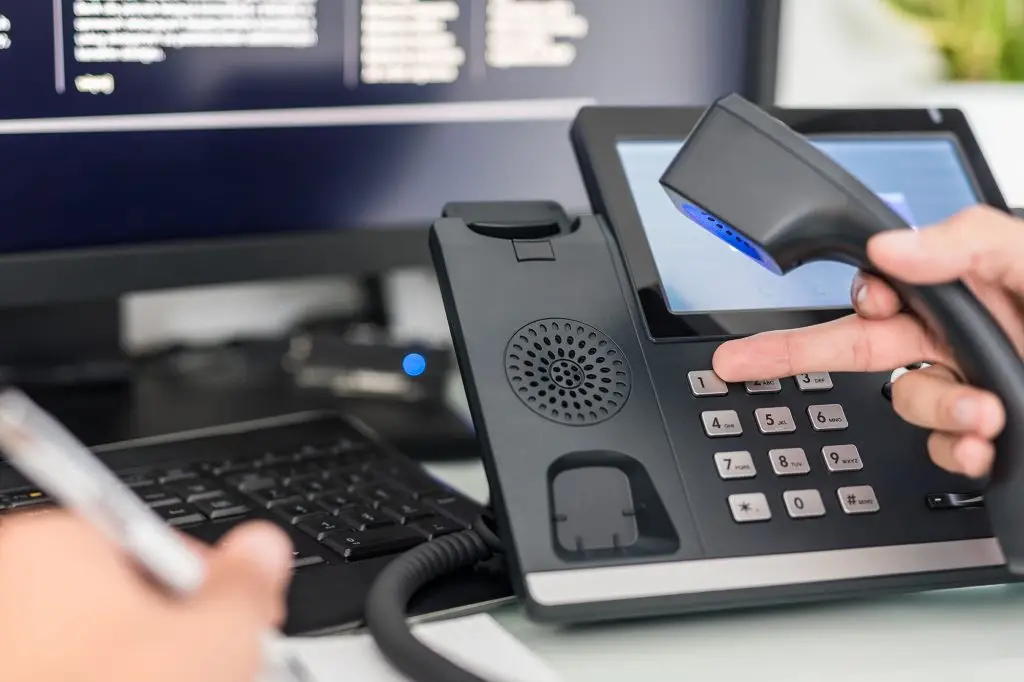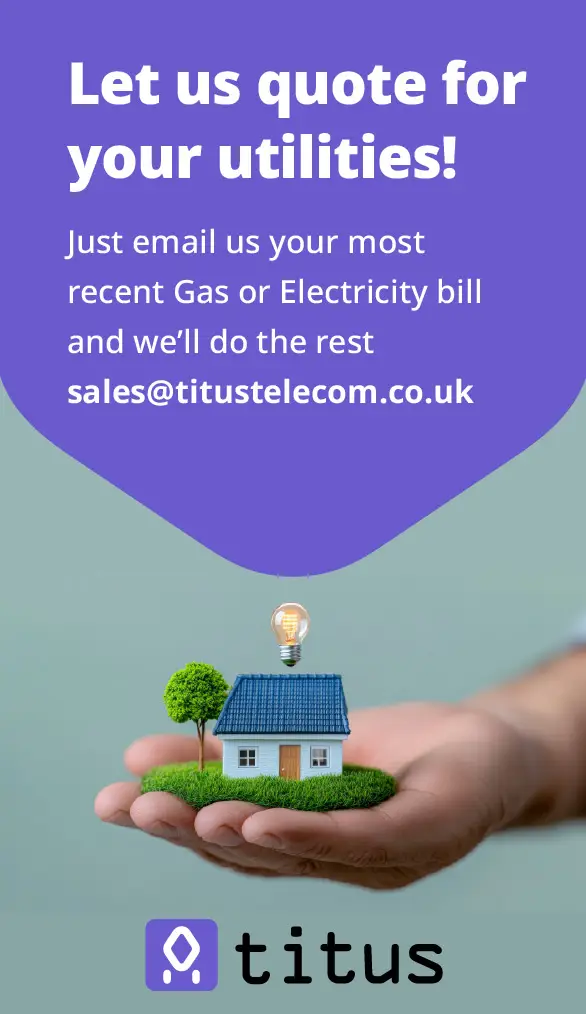
VoIP Phone Systems
VoIP (Voice over Internet Protocol) is becoming the go-to choice for phone systems across the UK because they’re cheaper to run, easier to manage, and packed with helpful features.
“Switching to VoIP was one of the simplest upgrades we’ve made. Our team can take calls from anywhere, and we’re saving money every month”
How VoIP Works for Your Business
VoIP gives you a flexible phone system that works on desktop, mobile, or laptop – so your team can make and take calls from anywhere.
Keep your number, set up in minutes, and manage everything online. As your business grows, you can add users and features easily, without needing new hardware.
Why Switch to VoIP?
Lower Costs
No phone lines or expensive hardware. Just flexible pricing and reliable call quality.
Work Anywhere
Make and take calls on any device, in or out of the office.
Smarter Features
Get call routing, voicemail to email, and other tools as standard.
Need Help Choosing the Right Telecom Solution?
Use the form below to tell us what you need help with. Whether you’re setting up business telecoms for the first time or reviewing your current setup, we’ll give you a clear, useful answer to help you make the right decision.
VoIP Phone Systems Trusted by UK Businesses, Large and Small
From local shops to national enterprises, transport services, and government agencies, organisations across the UK rely on Titus for dependable business telecoms.
See What Our Clients Are Saying
I use Titus Telecom for my personal mobile phone, I was so impressed with the service, I switched my internet and phones for my small business to them. Everything works as it should, but the standout for me is the service Titus provide. The installation of the phone system came with face-to-face training and Karen was more than happy to hang around and check everyone in the team was happy with the new handsets. Karen helped set everything up including landlines transferring to mobiles via an app, voice mail and holiday closure messages. The team at Titus are really responsive – highly recommended.
Fantastic company! Super helpful and knowledgeable and i find unlike most other suppliers Titus constantly try to save you money rather than cost you more! It is really quite lovely. Biggest praise to Karen who literally bends over backwards to make sure we are happy and any little issues are generally resolved in minutes! 1st class service- would 100% recommend!
Very good customer service and well-priced. Would definitely recommend.
Does your company needs a VoIP Phone System
This article breaks down what VoIP is, how it works, why it’s replacing traditional phone systems, and how to pick the right setup for your business. If you’re looking for a flexible and affordable way to handle business calls, read on.
1. What is VoIP and how does it work?
VoIP, short for voice over internet protocol, is a way to make voice calls over a broadband internet connection instead of using a landline phone. It works by turning your voice into digital data, sending it through your internet, then converting it back into audio for the person on the other end.
You can use VoIP through a physical VoIP phone, a desktop application, or a mobile app. It works anywhere you have internet access, meaning your phone system can travel with you or your team.
This approach is far more flexible than a fixed telephone setup, and it opens the door to features like video calls, digital voicemail, and call forwarding.
2. Why are VoIP phone systems becoming popular in the UK?
Businesses across the UK are switching to VoIP because it reduces costs and simplifies communication. VoIP calls often cost less than traditional calls, especially when it comes to long-distance and international calls.
Beyond cost, VoIP also brings better sound quality, more control over call settings, and the ability to scale as your business grows. You can start with a few users and expand without replacing hardware or rewiring your building.
It also lets teams stay connected across different sites, homes, or even while travelling. That level of flexibility used to be expensive and complicated. Now, with the right VoIP service, it’s quick and simple to set up.
3. How is a VoIP phone different from a landline phone?
A VoIP phone works over your internet connection. It can be a physical desk phone connected via Ethernet, a cordless IP handset, or software on your desktop or mobile. A landline phone, on the other hand, uses copper wires connected to a phone exchange.
VoIP phones often look like normal phones, but they have additional functions. For example, you can search contact directories, transfer calls to remote users, and sync call data with business tools.
Landlines don’t offer these functions. They’re limited to voice, and they’re tied to one location. VoIP phones are more flexible and offer better value for most business needs.
4. Is VoIP right for small business phone systems?
Yes. VoIP is well-suited to small businesses. It’s easy to set up and doesn’t require a big investment upfront. Many VoIP solutions are cloud-based, which means no physical PBX systems to install or maintain.
Small businesses benefit from features like call menus, mobile access, and desktop control panels, which used to only be available to large corporations.
You can use your existing broadband, add a few handsets or headsets, and get going in a matter of hours. For teams that want to sound professional while keeping costs low, VoIP is a smart choice.
5. What is a VoIP service, and what does it include?
A VoIP service is what makes the system run. It’s the platform that connects your phones to the internet and allows you to manage everything from one place.
It usually includes access to a management dashboard, voicemail, call logs, call recording, and support for desktop and mobile apps. It may also support integration with other tools like CRM systems, calendars, and helpdesk software.
A good VoIP service includes technical support and lets you add or remove users quickly. Some also offer voicemail transcription, which sends messages to your inbox as text, saving time and reducing missed information.
6. What are the main components of a VoIP phone system?
A typical VoIP setup includes:
A broadband connection
A VoIP-enabled handset or device
A router or switch to manage network traffic
A control panel for settings
Optional accessories like headsets or conference speakerphones
Some businesses also use VoIP gateways, which allow traditional phones to connect to the internet. This is useful if you want to use your existing phones while upgrading your phone system behind the scenes.
7. What features should you expect in the best VoIP system?
VoIP systems offer far more than just voice calling. Popular features include:
Call forwarding to mobiles or other devices
Video conferencing and screen sharing
Voicemail to email
Multi-level menus (IVR)
Internal chat and instant messaging
Automatic call distribution
Detailed call logs and analytics
The best VoIP systems also include options for managing business numbers, custom greetings, and user permissions. These features help streamline communication and improve your team’s workflow.
8. How fast does your internet need to be?
VoIP depends on your internet speed and stability. You don’t need blazing-fast fibre, but you do need a reliable connection. For each active voice call, plan on using 1 Mbps of both download and upload bandwidth.
If you’re running multiple calls, video conferencing, or using cloud software at the same time, make sure your broadband connection can keep up.
Having a separate network for voice traffic can help reduce interference and improve call quality. Some businesses install dedicated routers for VoIP to keep things smooth.
9. Can you use your existing phones?
Yes. In many cases, you can keep using your existing phones with the help of VoIP adapters. These small devices plug into your phone and your internet network, allowing analogue handsets to work with your digital system.
If you prefer not to use adapters, you can also install desktop applications or softphones on your computer. These work well with headsets and are ideal for call centres or admin teams who use their computers all day.
You can also mix and match devices across your team. Some may prefer a dedicated VoIP phone on their desk, while others use the mobile app when working on the go.
10. What are IP phones, and why are they useful?
IP phones are designed for VoIP. They connect directly to your network and communicate using internet protocols rather than analogue signals.
These phones come with features like digital displays, call buttons, directory access, and support for multiple lines. They are reliable, easy to manage, and often more durable than traditional phones.
For businesses making a lot of calls each day, IP phones offer better performance and control. They also make it easier to handle multiple incoming calls and transfer conversations between departments.
11. What is SIP and how does it work?
SIP stands for Session Initiation Protocol. It is the method used to start, manage, and end VoIP calls. SIP is responsible for setting up a connection between two or more people, making sure the call goes through, and then ending it cleanly.
Most VoIP systems use SIP because it’s reliable and works with a wide range of devices. It also allows for features like call forwarding, voicemail, and conference calling.
SIP enables flexible setups. You can route calls between different buildings, devices, or even countries, all without relying on a physical phone exchange.
12. Can VoIP support video conferencing?
Yes. Many VoIP systems now come with video conferencing built in. This allows you to run team meetings, client calls, or remote training sessions from your phone system.
Video calls can be launched directly from your desktop or mobile app. You can invite team members, share your screen, and record sessions if needed.
Having voice and video in one place saves time and keeps your communication tools simple. There’s no need for extra logins or platforms.
13. Is VoIP good for businesses working from home?
VoIP is one of the best options for remote working. It allows your staff to make and receive calls as if they were in the office, using the same phone number and extension.
Calls can be forwarded to mobile phones or laptops. You can even route calls based on availability or time of day.
VoIP systems also make it easier to manage remote teams. You can see who is online, monitor call activity, and adjust settings from anywhere.
14. What are VoIP plans and how do they work?
VoIP plans are the packages offered by providers. They usually come in three types:
Per-user monthly plans with a set feature list
Bundled plans with unlimited calls to specific regions
Custom plans based on usage or number of devices
Most providers offer different plans for small, medium, and large teams. Some even offer pay-as-you-go options for very small teams or seasonal businesses.
When choosing a plan, look at the call limits, support options, included devices, and integrations. You want a setup that fits your current needs, but can also grow with you.
15. How do I choose the right VoIP provider?
Start by checking which providers are available in your area and which ones have support based in the UK. Then compare them on:
Call quality and uptime
Range of features
Security tools
Customer service availability
Contract terms and pricing
Look for providers who offer a trial period or month-by-month contracts. This way, you can test the system before committing to it long-term.
Make sure the provider offers help during setup and can guide you through transferring your existing phone numbers and settings.
16. Can VoIP handle long-distance and international calls?
Yes. This is one of the biggest benefits of VoIP. Because calls go over the internet, you are not paying the usual fees associated with landline phone calls.
Many providers include international destinations in their monthly plans, or charge much lower rates than mobile or landline carriers.
If you work with suppliers or customers abroad, using VoIP can save a lot of money. It also allows you to set up international phone numbers, so customers can call you without paying overseas rates.
17. How secure is VoIP?
VoIP security depends on your provider and your setup. Most reputable services offer encryption, user authentication, and security monitoring.
You should also take basic steps like using strong passwords, updating devices regularly, and limiting access to sensitive call data.
A secure VoIP system gives you peace of mind, especially if your business handles client data or takes card payments over the phone.
18. Can VoIP improve call quality and productivity?
Yes. When set up properly, VoIP offers excellent voice quality, often better than traditional phone systems. This is due to the use of modern audio codecs and dedicated bandwidth.
VoIP also helps improve productivity. With features like call routing, real-time reporting, and CRM integration, your staff spend less time managing calls and more time speaking to customers.
VoIP systems also let you automate tasks like logging calls or following up with missed messages, which cuts down on admin work.
19. What types of businesses benefit most from VoIP?
VoIP works for nearly every type of business, but it’s especially helpful for:
Start-ups and small businesses
Remote or hybrid teams
Multi-location offices
Call centres or support desks
Freelancers who need a professional setup
Any business that makes regular calls, needs mobile access, or wants to reduce costs can benefit. Even tradespeople and solo consultants use VoIP apps to manage work calls from their personal mobiles.
20. Does VoIP integrate with other systems?
Yes. Many VoIP platforms integrate with other tools, including:
CRM systems
Email marketing platforms
Project management software
Helpdesk ticketing systems
Booking and calendar tools
These integrations reduce manual work and keep your communications connected. For example, incoming calls can pop up with the customer’s profile from your CRM, saving time and improving service.






